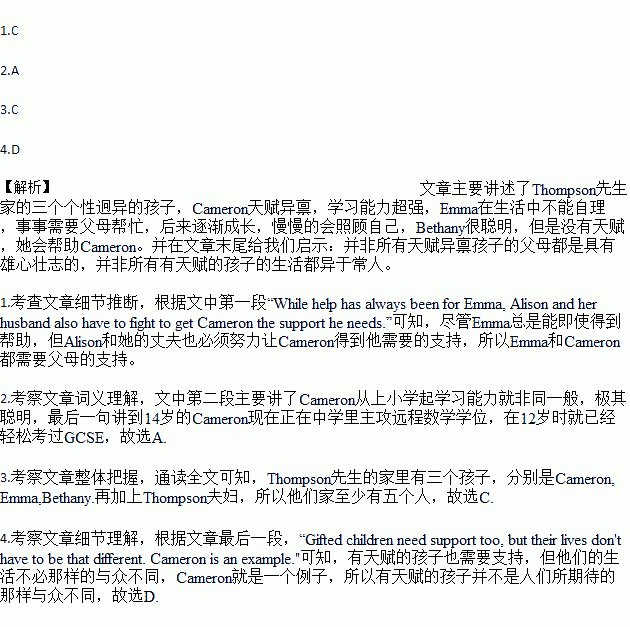题目内容
As her son Cameron sits at his laptop completing a task for his math degree course, Alison Thompson,a full-time mum,is busy helping her daughter Emma (two years younger than Cameron) get dressed. While help has always been available for Emma, Alison and her husband also have to fight to get Cameron the support he needs. “People could see that Emma has special needs but because Cameron was doing so well at school, his teachers never thought there was a problem with him.” says Alison.
It took Alison and her husband a while to realize their son was different. Cameron’s ability didn’t become clear until he began primary school. Once he even corrected the teacher when she told the class that zero was the lowest number. Cameron told her she was wrong because there were negative numbers (负数). He was four at the time. Now 14-year-old Cameron is at secondary school, studying for a distance learning math degree with the Open University, having sailed through his GCSE at 11 and his A-level at 12, achieving top grades.
Bethany, another daughter of Alison, is bright too but not gifted. She is the one who will remind absent-minded Cameron to put on his coat. She also helps him out in social situations.
Emma attends a specialist school and the family is quick to celebrate her successes too.
“The other day she did up the buttons on her coat, which was real progress,” Alison says.
Late last year the Thompsons took part in a television documentary (纪录片) to prove that not all gifted children are the result of extremely ambitious parents. Gifted children need support too, but their lives don’t have to be that different. Cameron is an example.
1.What does Paragraph 1 indicate?
A. Cameron helps Emma with her math tasks.
B. Teachers at school ignored Emma’s problems.
C. Both Cameron and Emma need parental support.
D. The couple often have fights because of Cameron.
2.What does the underlined phrase “having sailed through his GCSE” probably mean?
A. Having passed his GCSE easily. B. Having taken his GCSE seriously.
C. Having worked hard at his GCSE. D. Having suffered a lot from his GCSE
3.There are at least people in Mrs. Thompson’s family.
A. three B. four
C. five D. six
4.What can be known from the passage?
A. Emma has learned to take good care of herself.
B. Cameron showed his gift before primary school.
C. The children of the family are bright and gifted.
D. Gifted kids are not so different as people expect.
| A. | having ranged | B. | range | C. | ranging | D. | to range |
-I suggest you ______ him some specific questions about his work experience.( )
| A. | have asked | B. | will ask | C. | asked | D. | ask |
| A. | will conduct | B. | will be conducted | ||
| C. | has conducted | D. | is conducted |
| A. | whenever | B. | however | C. | whatever | D. | whichever |

